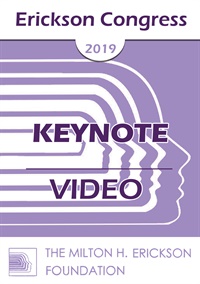IC19 Keynote 03 - Being True to Milton - Steve Lankton, MSW
- Average Rating:
- Not yet rated
- Topic Areas:
- Keynotes | Ericksonian Hypnosis and Therapy Techniques | History of Psychotherapy | Metaphors | Utilization | Experiential Therapy | Unconscious Processes
- Categories:
- Erickson Congress | Erickson Congress 2019
- Faculty:
- Stephen Lankton, MSW
- Course Levels:
- Master Degree or Higher in Health-Related Field
- Duration:
- 54 Minutes
- Format:
- Audio and Video
- Original Program Date:
- Dec 12, 2019
- License:
- Never Expires.
Description
Description:
Dr. Milton Erickson graduated from the University of Wisconsin’s School of Medicine in 1925. During the ensuing 55 years of his career, Erickson was devoted to researching, practicing, learning, refining, teaching, and publishing the lessons borne of his creative intuition and experience. And over the years his practices evolved. The last two decades of his life, and even more so in the 40 years since his death, through the efforts of those he influenced the number of ideas and interventions attributed to Erickson proliferated abundantly. His influence enriched the Palo Alto Mental Research Institute, Haley, de Shazer, Solution Focused Therapy, and drew attention to permissive and indirect hypnosis. There was also self-psychology, magic questions, possibility therapy, tools of intention, and more. Explanations of his work ranged from second-ordered learning, ultradian rhythms, baseball diamonds, butterflies, neurolinguistics, aesthetic art, building happiness, genomics, and even forays into speculative quantum consciousness.
Erickson cultivated and enriched our field. Yet, on this 40th conference, it is fitting to set these creative trappings aside. This is a keynote about his legacy, so we will rediscover what Erickson thought to be essential in his work. In his own words, beginning with his invariant definition of “change,” we will examine his conceptual evolution in three areas: (1) etiology of symptoms, (2) forms of suggestion, and (3) evocation of metaphors. Perhaps most importantly, this presentation will cover, and include clinical examples, of what he explained to me to be the 5 key elements upon which he built his approach: 1) utilization, 2) speaking the client’s experiential language, 3) reordering clients’ experiential resources, 4) conscious/unconscious dissociation, and 5) the power of ambiguity. In this, we will unlock the essence of what has made Milton Erickson’s contributions enduring.
Educational Objectives:
- Define a cure in Ericksonian terms.
- Describe implementing utilization techniques.
- Explain an ambiguous function assignment in treatment.
*Sessions may be edited for content and to preserve confidentiality*
Credits
Faculty

Stephen Lankton, MSW Related Seminars and Products
Stephen R. Lankton, MSW, is a Licensed Clinical Social Worker (LCSW) in Phoenix, Arizona. In addition to his extensive training in Gestalt Therapy, and Transactional Analysis, he studied regularly with Milton H. Erickson, M. D. from July 1975 through December 1979. He is the Editor-in-Chief of the American Journal of Clinical Hypnosis (since 2005) and a Life-Fellow of the American Society of Clinical Hypnosis (ASCH). He has maintained a private psychotherapy practice and trained therapists worldwide for five decades.
He is a Diplomate in Clinical Hypnosis, an Emeritus Clinical Member of the International Transactional Analysis Association (ITAA), and Past-President of the American Hypnosis Board for Clinical Social Work. He is on the teaching faculty of the Milton H. Erickson Foundation.
Steve has received two Lifetime Achievement Awards: the “Lifetime Achievement Award for Outstanding Contribution to the Field of Psychotherapy” from the Milton H. Erickson Foundation, and the “Lifetime Achievement Award for Contributions to The Field of Hypnosis” from the American Society of Clinical Hypnosis.
He served as Faculty Associate at Arizona State University (ASU) 2004-2008 and the ASU Graduate School of Social Work 2011- 2018 and was appointed by the Governor to the Arizona Board of Behavior Health Examiners where he served from 2009-2016 and was the Board Chairperson from 2014 to 2016.
He authored, co-authored, or edited 20 books on psychotherapy and hypnosis with translations in seven languages and over 68 chapters and peer reviewed articles including The Answer Within, and Tools of Intention and the recent “Chapter 8: States of Consciousness Model and Ericksonian Approaches to Hypnosis” in the Routledge International Handbook of Clinical Hypnosis.


